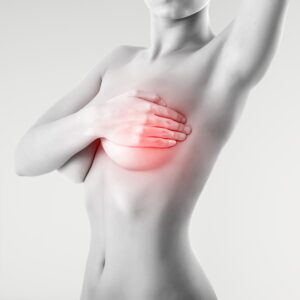Breast cancer is the most common cancer in women and the second most frequently diagnosed cancer in the United States. Only 10% of these breast cancer cases are due to inherited genetic defects. This means that the majority of breast cancer is not genetically caused and, instead, is preventable through a combination of diet, exercise and other lifestyle changes.
Medical Marijuana Cannabis Research relating to Breast Cancer suggests that cannabidiol (CBD) found in the cannabis or marijuana plant has the ability to reduce breast cancer in patients.
Medical Marijuana Cannabis Research on Breast Cancer
- Cannabidiolic acid-mediated (CBDA) selective down-regulation of c-fos in highly aggressive breast cancer MDA-MB-231 cells: possible involvement of its down-regulation in the abrogation of aggressiveness.
- Pathways mediating the effects of cannabidiol on the reduction of breast cancer cell proliferation, invasion, and metastasis
- Cannabidiol as a novel inhibitor of Id-1 gene expression in aggressive breast cancer cells
- Crosstalk between chemokine receptor CXCR4 and cannabinoid receptor CB2 in modulating breast cancer growth and invasion
- Anti-Tumor Activity of Plant Cannabinoids with Emphasis on the Effect of Cannabidiol on Human Breast Carcinoma
- Cannabinoids reduce Breast Cancer
- Cannabinoids: A New Hope for Breast Cancer Therapy?
- The Endogenous Cannabinoid Anandamide Inhibits Breast Cancer Cell Proliferation
- Delta9-Tetrahydrocannabinol Inhibits Cell Cycle Progression in Human Breast Cancer Cells through Cdc2 Regulation
- Cannabinoids reduce ErbB2-driven breast cancer progression through Akt inhibition
- Ketones and lactate increase cancer cell “stemness”, driving recurrence, metastasis and poor clinical outcome in breast cancer
- Delta9-Tetrahydrocannabinol Enhances Breast Cancer Growth and Metastasis by Suppression of the Antitumor Immune Response
- Targeting multiple cannabinoid anti-tumour pathways with a resorcinol derivative leads to inhibition of advanced stages of breast cancer
- Anandamide inhibits breast tumor-induced angiogenesis
Nutrition
Food culprits such as refined sugar, excess carbohydrates, saturated fat found in red meat and dairy, and alcohol are each and collectively associated with poor health and increased risk of breast cancer. On the other hand, consumption of at least 5 servings of vegetables and fruit every day lowers the risk of developing breast cancer by 25%. Add ½ hour of daily exercise to that healthy consumption of vegetables and fruits, and the risk of developing breast cancer is lowered by 50%! What is a serving of vegetables and fruit? One serving is equivalent to one whole fruit or one cup of raw vegetables or ½ cup of cooked vegetables. What kind of exercise is beneficial? Walking, bicycling, and swimming are ideal, and weight bearing exercise is critical for healthy muscles and bones.
Lifestyle
An important part of lifestyle-based breast cancer prevention is stress reduction. Recent studies have demonstrates that psychological stress accelerates tumor growth rates. Daily stress reduction with meditation, reading a good book, sitting in the sun, playing with your pet, spending time with your loved ones – all of these activities will lower stress and improve your immune defenses.
Supplements
Green tea is an important cancer prevention beverage and herbal supplement. Green tea consumption is associated with a significant reduction in the risk of developing breast cancer. Consumption of at least 5 cups of green tea daily reduces the risk of breast cancer by about 20%. Vitamin D is another important cancer fighting supplement. Many adults are deficient in vitamin D due to our limited sun exposure (we normally make vitamin D when our skin is exposed to sunlight). Deficient vitamin D levels are associated with an increased risk of developing breast cancer and with decreased survival of those women already diagnosed with breast cancer. Ask your doctor to check your blood level of vitamin D to determine if you are a candidate for supplementation. Finally, women with low levels of the hormone melatonin are at increased risk for the development of breast cancer. Night shift workers and ‘night owls’ are especially at risk since melatonin is secreted during the dark phase of the day while we are sleeping. Sleeping at night in a dark environment (no night lights!) will support your body’s production of melatonin. Melatonin can also be taken as a supplement under physician guidance in order to determine the best dosage.



















